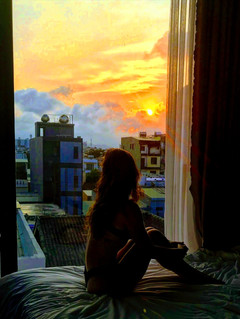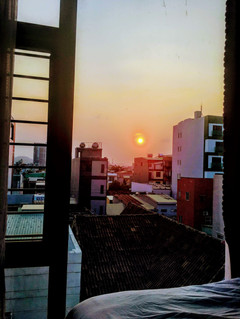Hitchcock's Portrait of Quarantine- Rear Window?
- Wandering Flâneuse

- May 8, 2020
- 4 min read
I lay horizontally on my bed. The bed, no matter how many times I sleep on it, consistently feels like a hotel bed. White sheets, white duvet, and white pillows firm and large. As I open my eyes, I draw back the hotel-like weighted curtains and become immediately blinded by the light that radiates in from our floor- to ceiling length window. As my eyes adjust, a foreign but familiar scene opens in front of my eyes. Hundreds of miniature windows look back at me, a material display of the vast quantities of lives existing beyond my small window of perspective. The sun beams down on the rooftops, with their flat metal roofs tinted with etches of rust on their surfaces, others showcasing fairy lights and benches ready for an evening of karaoke, some being invisible to my gaze, as they rise high above my 4th-floor apartment. As I drop my gaze, I see my Vietnamese neighbourhood, (or street should I say) and all of its various features and characteristics becoming retractable to my visiting gaze. I, like Jeff in Rear Window, have become restricted to the confinements of my private space, and use this to gaze upon the public, through my rear window.
Alongside Hitchcock is a long list of scholars, painters, and poets who have revisited the subject of public and private space in their work. Often examined, is the relationship between public and private spaces as mirrors of social relations, showing space as the main indicator of how a society organizes itself. The concrete and physical space of human societies often hold a greater psychological and cultural significance. For Jeff in Rear Window, a broken leg means Jeff spends his days and nights watching his neighbours through a pair of binoculars. The audience is shown life through Jeff's eyes within the six weeks in which he is restrained. The window is shown to represent almost a cinema-like view for Jeff. He is the spectator of the film and sits and watches from his chair. Rear Window is a commentary on social values, with different windows representative of different ways of living in America in the 1950's. The film provokes its audience to examine habits of their own, and to inspect their own lives, since society today, like Jeff and I, are guilty of casting the same outward eye. However, by gazing out onto the world, you can learn about the beauty of coexistence, and all the diverse and unique elements that this shared experience brings. Although being restrained within a spot can feel like a trap, it can be seen as an opportunity to learn more about yourself, and about others.
My neighbourhood street is narrow and around 400 m long. The street is populated densely on both sides. When you walk down my street, exterior surfaces of homes, spas, shops, and building sites, trees, and Vietnamese flags tower over you on either side. To touch one side of the street to the other takes around 3 big steps. In the morning, the rooster cries from his spot two doors down. He lives in a cage on a building site overtaken by my neighbours homegrown vegetables and plant pots. I can picture his home when I hear his call from my window. After, a drill usually kicks off at around 8 am, which comes from one of the streets mini-building sites. Da Nang is a developing city, with new construction taking place everywhere. I look out my window and see a female builder perched on the scaffolding of the 5th floor of what will soon be our new neighbours humble abode. During the day, I see a Grab driver chilling outside the home/ food spot that serves milk teas, alongside duck fried rice and spring rolls. As the afternoon approaches and I watch the sun turn red and descend from the sky, and the street's live concert begins. Vietnamese ballads that are cried out with passion through a microphone that is consistently on its highest volume. This usually takes place for a few hours daily, with their open plan front rooms allowing the private space to become visible and audible to the public. Usually The Family comes outside for their shared dinner. They sit on blue plastic chairs, bringing the kitchen to the street, as their children play around them while they dine. If and when you do walk past, know that it will take some time for the Matriarch of The Family to warm to you and smile back. If you are lucky enough to get a response of “Xin Chao" from her, I bet it will be one of the most assertive and powerful greetings you will ever come by.
As night lays its dark cloth over the sky, the lights of the city turn on. From my window in the near distance, I observe hotels flash their logos down the sides of their 16-floor buildings, with a light show of advertisements visibly flashing across the cityscape. The city invites you in, awaiting your response. The old man in the home that has the architectural design of a Buddhist temple, approaches his gate slowly as he swings his key and locks the thin, metal gate. His peaceful routine signals to the neighbourhood that it is time to lock up, come off the streets, and rest your weary head. The hum of the passing motorbike, the sound of glasses clinking in cheers, the call to the person across the street, the laugh from next door's apartment, the ruffle of sheets, the curtains being drawn, my window into the lives of others now beyond my gaze. I lie horizontally, in my hotel bed, hugging my hotel pillow, beside my rear window; a window of hope, of life, of work, of family, of rituals, of ingrained culture, of Asian lifestyle, of people living freely, of dreams, dreams of tomorrow.








Comments